- Home
- Barbara Kingsolver
Flight Behavior Page 7
Flight Behavior Read online
Page 7
It did get her out, among people. Whether friend or foe hardly mattered; they ate with their mouths closed and wore shoes without Velcro. She hadn't been much of a player in public after the diner closed six years ago, and she hadn't planned on missing those long days on her feet or the wages that barely covered her gas. But being a stay-at-home mom was the loneliest kind of lonely, in which she was always and never by herself. Days and days, hours and hours within them, and days within weeks, at the end of which she might not ever have gotten completely dressed or read any word longer than Chex, any word not ending in -os, or formed a sentence or brushed her teeth or left a single footprint outside the house. Just motherhood, with its routine costs of providing a largesse that outstripped her physical dimensions. She'd seen ewes in the pasture whose sixty-pound twins would run underneath together and bunt the udders to release the milk with sharp upward thrusts, jolting the mother's hindquarters off the ground. That was the picture, overdrawn. A gut-twisting life of love, consecrated by the roof and walls that contained her and the air she was given to breathe.
But here was church. An hour in the cafe, the slake of a tall cup of coffee, and stillness, and wearing shoes, a clean tile floor, time off for good behavior. A reminder that she could belong to something the size of this congregation, if they would have her. She was not outside the believer realm entirely. She'd had her phases. Back when her daddy lost everything at once--his furniture-making business, his health, his inner light--she'd prayed for Jesus to bring it all back. When he died, her mother resigned from religion and left Dellarobia working a double shift. By the time her mother got sick, the whole enterprise was tainted with doubt. Cub had persuaded her to give prayer another shot during the years when they were trying and failing to get pregnant, and finally that one had been answered times two, Preston and Cordie, sufficient for the time being.
So she was what Hester called a 911 Christian: in the event of an emergency, call the Lord. Unlike all those who called on Jesus daily, rain or shine, to discuss their day and feel the love. Once upon a time she'd had her mother for that. Jesus was a more reliable backer, evidently, less likely to drink himself unconscious or get liver cancer. No wonder people chose Him as their number-one friend. But if the chemistry wasn't there, what could you do? Dellarobia scrutinized life too hard, she knew that. For a year she'd gone with Cub to Wednesday Bible group and loved the sense of being back in school, but her many questions did not make her the teacher's pet. Right out of the gate, in Genesis, she identified two completely different versions of how it all got started. The verses could be a listen-and-feel kind of thing, like music, she'd suggested, not like the instruction booklet that comes with a darn appliance. A standpoint that won no favors with the permanent discussion leader, Blanchie Bise, cheerleader for taking the Word on faith. For crap's sake, the first rule of believable was to get your story straight. Hester let Dellarobia stop coming to Wednesday Bible.
She paused in the doorway of Holy Beacons, the name given the sanctuary, where anyone present might be called out by Pastor Ogle as a beacon. The newly remodeled sanctuary was huge. This church was the biggest show in Feathertown by far. Bobby Ogle pulled people out of bed from far and wide on Sunday mornings, even from the larger town of Cleary, fourteen miles away. Dellarobia studied the backs of all those heads, the females vivid with individualized hues, the males surprisingly uniform. Three hundred people quieting down, readying themselves for what they were about to receive. The nourishment was so real to them. Dellarobia felt a stab of envy, as if everyone here was getting a regular paycheck and only hers bounced. It made no sense. Up on the mountain that first day, she'd had no trouble believing in some large glory tailor-made for herself, but here in this fold she struggled with everlasting doubts as to her status. The sole glory she could hold in mind at the moment was the blueberry muffin she'd planned to buy in the cafe. She craved it like a cigarette: the sticky, too-big puffiness of that muffin spilling over its fluted paper cup, crumbling all over the table, sweetly filming her throat with whatever it was those things had. Probably something that bunged your arteries like bacon grease in a drain. She weighed her options: that muffin, Crystal, Brenda. No. She located the back of Cub's head towering over his mother's and moved down the center aisle toward them, avoiding eye contact with the sanctuary regulars.
She scooted in next to Cub. He was thrilled, reaching for her hand and threading his big fingers through her little ones. It was mildly painful but authenticating, to have him lay claim to her here in front of Hester and God, in case either of them was looking. That was one thing she could do well, make Cub happy, if only she could apply herself. She took this vow as regularly as she breathed, and reliably it was punctured by some needling idea that she was cut out for something more. Something, someone. She leaned against his shoulder and sighed, wistful for the breakfast that almost was. She could make it through another hour if her stomach wouldn't growl.
She watched Pastor Ogle walk onto the stage, dressed exactly as usual in jeans and an open-collar shirt, nothing out of the ordinary. Yet the congregational atmosphere shifted like weather. Given the drawing in of breath, the speculative waiting, Bobby Ogle could be that famous groundhog that would or wouldn't see his shadow. If she ever had people's attention like that, even for ten seconds, there was no telling what she'd say. Bobby was amazing. And he hadn't even called the faithful to order yet, he was just checking in with the choir director before the opening hymn. She'd seen TV preachers with styled hair and diamond rings that sparked in the studio lighting, and wondered how anyone trusted such showy men with their tithes. Pastor Bobby was the opposite, possessed of the same rumpled appeal Jesus probably had. Maybe in this day and age Jesus would buy his clothes at the outlet stores where the Ogles shopped, and shed the hippie haircut for one like Bobby's, with bangs straight across. He looked like some kid you'd want to invite home for dinner. Though Bobby, unlike Jesus, might empty your fridge. He must weigh 280 at least. He'd played football for the Feathertown Falcons, as Cub did five years later when he got to high school. She happened to know they'd called him Titty Ogle back then, due to his anatomy. Kids are evil. Which of these congregants remembered that now? She'd bet money that some of these churchful people had once laughed at Bobby Ogle in his football uniform with his chest bob-bob-bobbing along the fifty-yard line. But he had made something of himself, gone to seminary school, founded this church with his wife, and raised up a set of twin girls, never allowing bitterness to curdle his spirit. His face told the whole story now, as he listened to the choir director: pure patience. Even though most people found Nate Weaver way too full of himself. Nate seemed dressed for a whole different show, packed into his shiny brown suit like a sausage casing, and his new little goatee did nothing to hide his double chin, if that's what he was thinking. Dellarobia knew these thoughts made her a small person.
Pastor Ogle could look past petty things. He clapped Nate kindly on the shoulder and walked to center stage to stand a moment in the bright stage lights with his head bowed, no notes in hand. No pulpit. Just plain Bobby, standing on the pool of his own shadow. He motioned then for the congregation to stand for the hymn, "What a Friend I Have in Jesus," and all rose. Mr. Weaver pumped his hand to direct the choir in the too-vigorous way that got on Dellarobia's nerves. Hester was hogging the hymnal, making Cub share it on her side, managing to imply even in the Lord's abode that three was a crowd. She looked fanciful as ever today, in a blue dress with a ruffled stand-up collar of the type Loretta Lynn made famous at the Grand Ole Opry. Pastor Ogle had lured Hester over from a harder line of Baptists, and Dellarobia knew some marital compromise was involved. Bear had stopped attending over there. Here he could sit out the service in Men's Fellowship, which had checkers and country music pitched low enough you could still hear the sermon on the closed-circuit if you so desired. Bobby had found the key to modern believers: that many preferred their salvation experience to come with a remote.
Dellarobia thought Men's Fello
wship had its appeal, all the more so right now as the audience heaved into verse four of "What a Friend," dragging it like a plow through heavy clay. Certainly in Men's Fellowship no one ever made you sing. She just wished it had a more welcoming vibe for the female of the species. She'd strolled through a time or two to retrieve a Diet Coke out of the machine, and observed that they even allowed smoking. The family always split four ways, Bear going with the men, the kids to the Sunday school, she to the cafe, and Hester to the sanctuary with Cub in tow, playing her boy like a trout on a line, always reeling him in at the end. Dellarobia had tried to get Cub to go with her to the cafe, which was mostly younger women, but also some couples, "Christ's love everywhere in equal measure" being the theme of the Ogle ministry. But there was no battling Hester, she was wired to win, just made that way: sinewy, righteous, unbeatable.
Soft, round Bobby was precisely the reverse. He won people over in a different way, using his hands to push and pull his congregants as if kneading dough and making grace rise. Like a humble baker making bread. He was actually a foundling, people said, abandoned at birth, adopted by an elderly minister and his wife who'd since passed away. Dellarobia wondered what that would feel like, to have no inkling of your people. All hers were dead, but at least a known quantity. Bobby dedicated every Mother's Day sermon to the saintly woman who'd taken him in, heeding God's call to embrace the rejected and discarded. Bobby was love personified, to the extent that this was rumored around town to be a no-heller church. Or that in Bobby Ogle's version of heaven everyone would wind up in one place, criminals and Muslims included. Dellarobia could not confirm or deny the accusations; in Bobby's light all things seemed possible. The way he was warming up right now, with everyone singing happiness and love in his general direction, his body seemed to be manufacturing some kind of vitamin from the gaze of the worshippers. Hester's ponytail practically flapped in the breeze of hallelujah.
After the hymn Bobby said quietly, "Would you be seated," no question mark, his hand moving toward the floor as if urging a dog to sit. They sat. Dellarobia kept her eyes open during prayers, a long habit, just a watchful person by nature. She quietly snapped open her purse and made sure her phone was on vibrate, since Dovey liked to text her on Sunday mornings for her own entertainment. There was one waiting now: COME YE FISHERS OF MEN: YOU CATCH, GOD WILL CLEAN. Dovey's fondness for one-liners-in-Christ was bottomless, she collected them off church marquees. Back before texting, she used to pass them over during health or history class on scrims of folded paper. Dovey was Italian Catholic, she and her five brothers with all that darling mess of dark curly hair, and claimed she'd logged enough church hours in childhood to do her for life. Dellarobia fished her glasses out of her purse and put them on, possibly to spite her mother-in-law. "Boys don't make passes at girls wearing glasses," Hester liked to singsong, a joke so tired she could scream. If boys didn't, the woman would not have the grandkids she did at this point in time. People could overlook anything when it suited them, right down to the making of the Lord's baby children.
Bobby wound up the prayer with a reminder to hold the sick and beleaguered in their hearts, and named off congregants who could use that kind of help. The list was impressive. He never used notes. She tried to put the near miss of the muffin out of her mind, but it loomed in the thought bubble over her head, attaining Goodyear-blimp size. Bobby's plaid shirt was from Target; she'd considered that same one, shopping for Cub. No shiny suits for Pastor Ogle, he was not into things of this world. Just love. She caught his mention of upcoming Thanksgiving services before she zoned out again. Her mind was flipping through channels the way Cub did with the TV remote every evening, a form of persistent inattention that made her crazy, yet here she was. The blasted muffin would not leave her brain. They were supposed to go to Hester's for Sunday dinner. She remembered a navy blouse she'd borrowed from Dovey for a funeral back in June. Seeing Eula Ratliff in the choir had caused her to think of that. It was Eula's mother who died. That blouse could easily have hidden in Dellarobia's cramped little closet until someone else died--not that it mattered, her closet and Dovey's were more or less merged by now, they'd worn the same size since eighth grade. The same size, meaning they were the size of eighth-graders still. Dovey called that an achievement on Dellarobia's part, after three pregnancies, but to her mind fitting into a size zero did not count for much as an accomplishment. It sounded like nonexistence. She sometimes wondered if subconsciously she'd gone for Cub just for the increase in marital volume.
A couple ducked in late, slid into the pew next to her, and promptly closed their eyes in prayer, leaving Dellarobia free to scrutinize them. The man wore sporty sunglasses pushed on top of his head as if he'd just hopped out of a convertible. But if that was the wife with him, there was no convertible in the story. She'd probably spent two hours getting her hair organized and congealed, the bangs individually shellacked into little spears, all pointing eyeward, which made Dellarobia cringe. She had a thing about eyes. Preston had a habit that killed her, of poking himself along the hairline with his pencil while pondering what to write. Every pointed jab went into her own flesh, her own eyes wincing reflexively. She was tempted to hide his pencils.
The assistant pastor read a Bible passage about the Lord shaking the wilderness and making the oak leaves whirl, presumably to remind everyone it was fall. The man with the sporty sunglasses now seemed to be checking her out on the sly. Dellarobia had gone through her phase of miniskirts in church, egged on by Dovey, who once gave her a creepy antique fox stole with intact head and tail, on a dare that she would wear it here. That was pre-kids. Now she was lucky just to get everything zipped and buttoned, shooting for decency and not for show, a green turtleneck sweater and denim skirt today. But those boots. She ought to throw them in a river.
The choir lit into a rock-and-roll version of "Take My Life and Let It Be," with electric guitars, keyboard, and drums. The congregation was allowed to join in, but on the choir's special numbers the sound system gave them the upper hand and they always sounded great, like hymns on the radio. The pompous Mr. Weaver notwithstanding, the choir looked like they were having a barrel of fun. All except one older fellow who was too earnest, holding his hand to his chest as if asking Jesus to marry him, fearing the wrong answer. The rest looked thrilled, raising their eyebrows and singing an exclamation point at the end of every line: "Take my feet and let them be! Swift and beautiful for thee!" She picked out those who'd been in her graduating class: Wilma Cox in the gigantic checkered top. Tammy Worsham, briefly Squier and now Banning, with her blue eyeshadow and a little more cleavage than necessary for the eyes of the Lord, it could be said. Quaneesha Williams, the sole African American choir member, who was jiggle-dancing to the music, plainly yearning to bust some bigger moves. Dellarobia was with her, everything here would go down better if you could dance. Some of life's greatest calls were answered not by the head but by the body. Which is what got her into trouble, of course, most lately with the telephone man. Who was she to judge Tammy's husband-collecting and cleavage? Her mood spiraled and crashed like a clipped kite.
Pastor Bobby launched his sermon with a quote from Corinthians: "Take captive every thought to make it obedient to Christ." Well, Dellarobia thought, read my mind, why don't you. She had all but flayed her flesh for months to stop thinking wrongful thoughts, and in the end what it took was a burning bush that turned out to be butterflies. Now she tried often to guide her mind back to the vision of those fiery hills, especially at night, hoping to lie down feeling like a person of some worth.
"Jeremiah seventeen-nine tells us about disobedient thoughts," Bobby said. " 'The heart is deceitful above all things and beyond cure.' Now this is hard to admit, because it scares us, but it's true. Every one of us here, and I'm speaking of myself too, we can look something straight in the eye and give it a different name that suits us better." He had wide-set eyes and an entreating way of holding his hands palm-up. It was hard to imagine a lot of domestic drama at his ho
use. But really, who didn't lie to himself? "We might call it ambition," Bobby said. "We might call it a great passion. When the true name of what we're dealing with is greed, or lust. We all have the special talent of believing in a falsehood, and believing it devoutly, when we want it to be true."
"Yes, brother," someone said softly from the darkness.
"That is how our Creator made us. He knows we are thus inclined."
Bobby again was answered with gentle assent. He looked out at his flock with the kindest gaze, like a father having an important talk with his young sons. "The Lord wants us to secure our hearts against things that lure us wrongly. When we're struggling with jealousy, and guilt, and impatience, and hardness of heart, and lust, He wants us to use our rational minds and call these things by their true names. We all want to be in our minds, and not out of them. We need them to behave. How do we do that?"

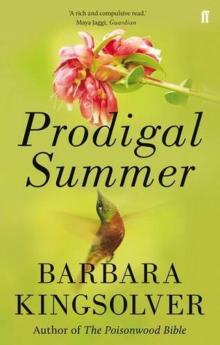 Prodigal Summer: A Novel
Prodigal Summer: A Novel Animal Dreams: A Novel
Animal Dreams: A Novel The Poisonwood Bible
The Poisonwood Bible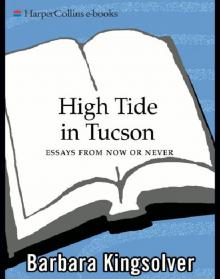 High Tide in Tucson
High Tide in Tucson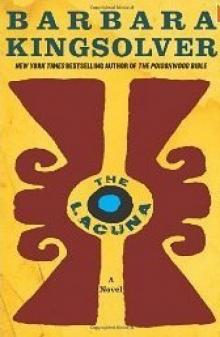 The Lacuna
The Lacuna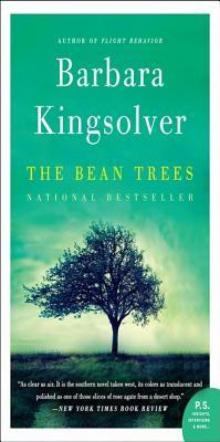 The Bean Trees
The Bean Trees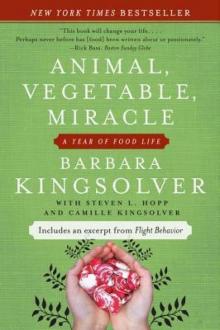 Animal, Vegetable, Miracle: A Year of Food Life
Animal, Vegetable, Miracle: A Year of Food Life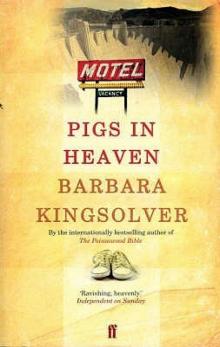 Pigs in Heaven
Pigs in Heaven Small Wonder
Small Wonder Flight Behavior
Flight Behavior Homeland and Other Stories
Homeland and Other Stories How to Fly (In Ten Thousand Easy Lessons)
How to Fly (In Ten Thousand Easy Lessons) Unsheltered
Unsheltered Animal Dreams
Animal Dreams Prodigal Summer
Prodigal Summer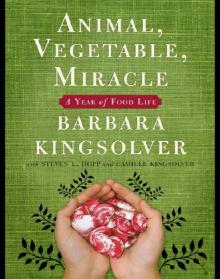 Animal, Vegetable, Miracle
Animal, Vegetable, Miracle